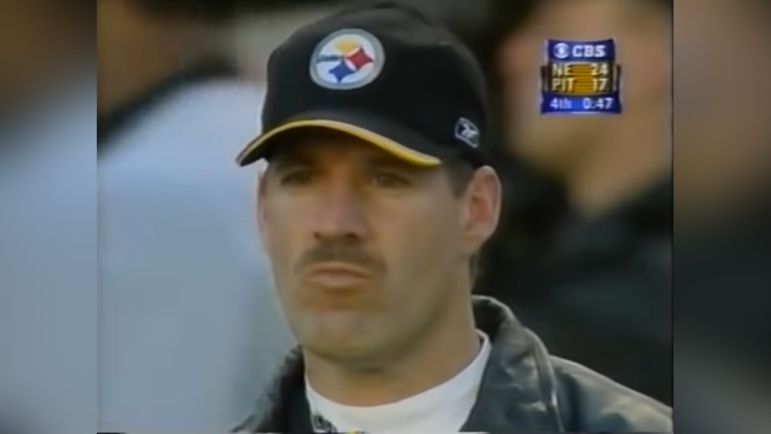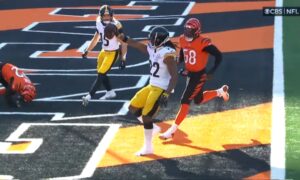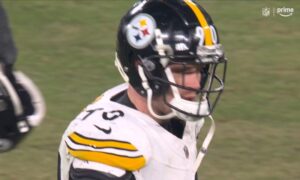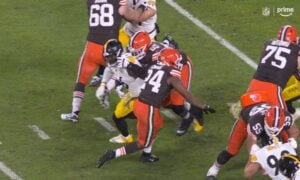Bill Cowher coached 261 games in his career, 240 in the regular season, another 21 in the playoffs. With that kind of longevity, he experienced the highest of highs and the lowest of lows. After years of coming oh-so-close, Cowher won a Super Bowl, his Pittsburgh Steelers’ team knocking off the Seattle Seahawks in Super Bowl XL.
Success can be defined as standing on top of a pile of your failures. For Cowher, one of those painful moments on the way to hoisting the Lombardi Trophy was the 2001 AFC Championship Game against the New England Patriots. The first of two such playoff defeats to Bill Belichick’s Patriots, Cowher says it remains the top game that keeps him up at night.
Cowher joined Dan Patrick on the aptly named Dan Patrick Show and was asked for the loss that still makes him toss and turn.
“Probably the 2001 AFC Championship Game against the New England Patriots,” Cowher said. “We knocked Brady out. We brought [Drew Bledsoe] in. We gave up a punt return for a touchdown because all of a sudden we kicked the ball from the left hash from our own five yard line. We had a guy run out of bounds, Troy Edwards, they replayed it, pushed us back. They put the ball in the right hash.
“My punter Josh Miller kind of didn’t know what we were supposed to do. If I was supposed to kick it back into the boundary. Do I go to the other boundary, I didn’t know what he was talking about. I didn’t even realize they’d moved the hash. He kicked it right down the middle of Deion Branch, just took it right back for a touchdown.”
We mentioned the infamous moment with Edwards years ago in our video recapping his career as a talented but failed Steelers’ first round pick. After a successful Josh Miller punt, Edwards was flagged for running out of bounds on his own accord, a five-yard penalty.
It forced a re-kick and for some reason, the officials moved to the ball to the opposite hash. As Cowher told Miller, the plan was to punt left and into the boundary (closed) side to reduce the returner’s space. With the ball now on the other hash, Miller was unsure if that was still the plan.
On the re-kick, Troy Brown (the only thing Cowher got wrong in his retelling was saying it was Deion Branch, it was Brown) took the ball up the middle for a 55-yard touchdown, giving the Patriots a 7-0 lead they wouldn’t give back. And it was Edwards, who barely even left the goal line as Branch sprinted into the end zone.
But it was far from the only special teams miscue.
“We go to kick a field goal, it gets blocked for a touchdown. We had almost a hundred yards more than they did. But yet we lost the game. That was a very, very good team in 2001. So I look at those championship games and I think about those.”
Trailing 14-3 midway through the third quarter, kicker Kris Brown lined up for a 34-yard field goal. But DL Brandon Mitchell broke through the line and blocked the kick, the ball ricocheting to the right. Troy Brown picked it up and lateralled to Antwan Harris who ran the rest of the way, high-stepping into the end zone.
Even with an injured Brady, the Patriots built enough of a lead and hung on to win 24-17. The reason it was so crushing was because New England’s offense did almost nothing. They had more special teams touchdowns (two) than offensive scores (one) and registered just 259 yards of total offense. Their longest play from scrimmage was just 28 yards. But the Steelers turned the ball over four times and had crucial special teams blunders that gave the game away.
Cowher also mentioned his Super Bowl loss to the Dallas Cowboys and Neil O’Donnell’s backbreaking interceptions. But it seems like the 2001 game ate at Cowher all the more. Maybe it’s because this loss helped propel the Patriots to begin their dynasty and Tom Brady’s start of becoming the most successful quarterback in NFL history.
In the end, Cowher got his redemption, his Super Bowl ring, and a place in the Pro Football Hall of Fame. That takes the sting out of those losses. At least a little.








